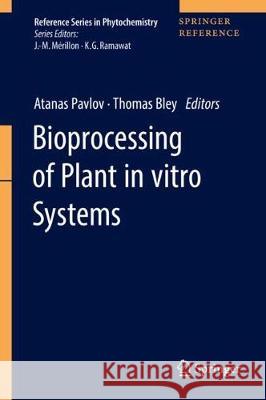Bioprocessing of Plant in Vitro Systems » książka



Bioprocessing of Plant in Vitro Systems
ISBN-13: 9783319545998 / Angielski / Twarda / 2018 / 589 str.
Bioprocessing of Plant in Vitro Systems
ISBN-13: 9783319545998 / Angielski / Twarda / 2018 / 589 str.
(netto: 2113,61 VAT: 5%)
Najniższa cena z 30 dni: 1542,20
ok. 16-18 dni roboczych.
Darmowa dostawa!
This handbook presents how plant in vitro technologies can overcome current limitations in the production of important plant-derived substances.
Plant cell culture technology: A next generation system for sustainable production of valuable natural products.- Engineering cell and organ cultures from medicinal and aromatic plants toward commercial production of bioactive metabolites. - Plant in vitro systems as sources of food ingredients and additives. - Hairy root in vitro systems for bioactive substances production. - Sustainable production of polyphenols and anti-oxidants by plant in vitro cultures.- Production of iridoids and phenylethanoid glycosides by in vitro systems of plants from Orobanchaceae, Budleyaceae and Scrophulariaceae families.- Amaryllidaceae alkaloid accumulation by plant in vitro systems.- Taxus cell cultures, an effective biotechnological tool to enhance and gain new biosynthetic insights into taxane production.- Bioactive substances from grape cell cultures.- Bioreactor technology for sustainable production of plant cell-derived products.- Large-scale cultivation of plant cell, tissue and organ culture for bioactive substances production.- Monitoring of plant cells and tissues in bioprocesses.- Genetic transformation of hairy roots for improvement of yields of secondary metabolites.- Elicitation of secondary metabolism of plant cells cultivated in vitro.- Permeabilization-mediated recovery of metabolites from plant cultures.- Polyploidy and secondary metabolism of plant cells cultivated in vitro.- Application of GC-MS in in vitro plant metabolite profiling.- Microbial transformations of plant secondary metabolites.- Plant micropropagation.- Safety assessment of food ingredients from plant cell and tissue cultures.
1997-2026 DolnySlask.com Agencja Internetowa
KrainaKsiazek.PL - Księgarnia Internetowa









